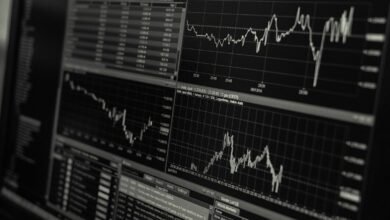Famed Economist Warns AI Bubble Is Unraveling

April’s jobs report fell short of expectations: The Bureau of Labor Statistics said on Friday that the US economy added 175,000 jobs last month, shy of economists’ forecasts for 238,000 and well below the 274,000 average jobs added per month from December to March.
While one month of data does not make a trend, some bearish market observers say the fresh numbers could be a preview of more significant weakness ahead.
David Rosenberg, the founder of Rosenberg Research who called the 2008 recession while working as Merrill Lynch’s chief US economist, counts himself among the skeptics of the US economic expansion.
In notes to clients on Friday, Rosenberg said that headline monthly jobs data has been inconsistent with the BLS’ Business Employment Dynamics data, which showed the US economy lost 192,000 in the third quarter of 2023, according to the most recent numbers available. Over that time, the non-farm payrolls survey showed that the US economy gained 640,000 jobs.
Non-farm payroll data is also not in line with the BLS’ Quarterly Census of Employment and Wages data, which shows much softer job growth in Q3 last year.
Given the disparity, Rosenberg said that non-farm payroll data is “overstated — by historical proportions” and blamed the method the BLS uses to collect the data. The BLS surveys a sample of businesses to produce its monthly reports, but Rosenberg claimed that its findings are inaccurate because of low response rates and the Bureau not being able to know if some businesses shut down, leading their employees to find work elsewhere.
Accordingly, some substantial downward revisions to non-farm payrolls data are coming in the months ahead, Rosenberg said, much to the surprise of investors and the Federal Reserve.
“The revisions will not be coming for another six months and when they do get released, it will come as a shock to the Fed — and to the markets as well,” Rosenberg said. “The Fed now intends to stay on the sidelines as it closely watches lagging and contemporaneous indicators that are littered with high error terms, and the longer it waits, the more it is going to have to do on the rates front. Shades of 1991, 2001 and 2008.”
In addition to believing jobs data is distorted, Rosenberg has said in recent months that stock prices and valuations are disconnected from the macroeconomic picture.
In a note on April 23, he said that AI stocks — which include some of the largest firms by market cap — have been in a bubble that is now deflating.
“The market action last week was part and parcel of the air being let out of the AI balloon, with Nvidia experiencing its worst single-day drop since March 2020. The intense AI-fueled momentum to the upside is now heading in reverse,” Rosenberg said.
The chart below shows the AI boom — represented by the yellow line — with AI stocks climbing several hundred percent since 2022.
Rosenberg Research
Downturn or no downturn
Rosenberg has been notoriously bearish over the last couple of years, repeatedly warning of a recession.
But so far, an economic downturn has not materialized. The unemployment rate has remained under 4% despite the Fed’s aggressive rate hikes, and consumers have continued to open their wallets even while inflation has stayed elevated.
The consensus among economists is that there is a 40% chance of a recession in the next year, according to a February survey from Bloomberg, and top stock market strategists see the S&P 500 closing out 2024 in the green.
But while the outlook for the US economy has generally improved over the last year, a recession is still very much possible. Classic recession indicators — including the Treasury yield curve, which has inverted before every recession since the 1960s — continue to flashing warning signs.
Some labor market gauges are also deteriorating as they have heading into prior downturns. For example, layoff announcements are up, suggesting jobless claims could soon rise as well.
Pantheon Macroeconomics
As Rosenberg points out, the longer the Fed keeps rates elevated, the higher the risk of a recession becomes.
“My biggest concern is that the Fed, by focusing almost exclusively on flawed government data releases and now shunning all the evidence of benign inflation pressures and economic softness from a wide array of survey information and its very own Beige Book, is going to end up making a policy misstep by waiting too long to remove its monetary restraint,” Rosenberg said.
Source link





